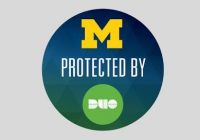Category Archives: Safe Computing
Catching up on The Feeling of Being Watched
On the day the U.S. Senate confirmed the nomination of the first Black female justice to the United States Supreme Court, four women of color engaged in an illuminating conversation about government surveillance. The conversation was part of an event, sponsored by Dissonance, Information and Technology Services (ITS), and Wallace House, that invited the U-M community to watch… Read More »
Identity Management Day 2022
Watch out! How to avoid tax season scams
Transition from Cosign to Shibboleth Authentication
The ITS Identity & Access Management team (IAM) has finalized plans to reach key milestones that will remove dependencies on the Cosign authentication service by summer 2022. Cosign has been the university’s secure, single sign-on, web authentication system for more than 20 years. Originally designed at U-M, the open source software was once widely used across higher education.… Read More »
The Feeling of Being Watched virtual screening and discussion
Dissonance, Information and Technology Services and the Wallace House invite you to participate in a complimentary viewing of the film The Feeling of Being Watched, and accompanying post-viewing discussion. Algerian-American investigative journalist, filmmaker, and Knight-Wallace Reporting Fellow Assia Boundaoui, grew up outside of Chicago, in an Arab-American neighborhood where most people believed they had been under surveillance for… Read More »
Log4J Zero-day Vulnerability and the U-M Response
In early December 2021, the world was faced with yet another massive zero-day vulnerability, when news broke that Log4j was being used to perform remote code execution and provide unauthorized access to servers. This vulnerability was quickly exploited to do everything from crypto-currency mining to ransomware installation. Log4j is a piece of open-source software used by numerous vendors… Read More »
African Americans in cryptologic history
African Americans have served in the U.S. military since the revolutionary war, although the armed forces were not officially desegregated until 1948. Unfortunately, their service is all too often downplayed or not prominently known. One story that deserves highlighting is the cryptologic work done by William Coffee in the agency that would eventually become the NSA. Mr. Coffee… Read More »
Privacy Day keynote — Beyond privacy with Gabriela Zanfir-Fortuna
U-M celebrated Privacy Day for the fifth year through a month’s worth of programming co-convened by ITS Information Assurance and the School of Information. At U-M’s 2022 Privacy Day keynote presentation, Dr. Gabriela Zanfir-Fortuna, vice President for Global Privacy at the Future of Privacy Forum, walked her audience through the key concepts of privacy and data protection and… Read More »
Data Privacy Month: Privacy awareness in higher education
ITS Information Assurance kicked off Data Privacy Month with a presentation on Privacy in Higher Education by Autumm Caines, instructional designer at UM-Dearborn’s Hub for Teaching and Learning Resources. Autumm set the stage for an engaging Zoom session by using compelling examples to shine the light on inherent issues associated with algorithmic profiling and predictive technology. She introduced… Read More »
ITS Service Center uses Disaster Recovery Plan to adapt quickly
On December 7, due to an outage with AWS US-East-1, the Information and Technology Services (ITS) Server Center’s Amazon Connect call center software could not receive calls or chats, leaving callers getting only a busy signal and chatters getting no response at all. While multiple systems were impacted (including Canvas, MiVideo, and Code42 Crashplan), the Service Center turned… Read More »
Protecting your accounts and devices — an online self-defense workshop
The Security Privacy Interaction Lab (SPI Lab) at U-M, led by Florian Schaub, assistant professor in the School of Information and College of Engineering, is a team of researchers studying privacy and security issues in today’s digital world. As part of Privacy@Michigan — U-M’s Data Privacy Day celebration, Yixin Zou, a PhD student in the School of Information,… Read More »
How to safely shop online
Keeping your family safe online: New devices for the holidays
Not much compares to the feeling of watching someone you love open that new iPad they’ve been begging for, or the milestone of receiving their very first smartphone. Unfortunately, the excitement of new devices during the holidays can be eclipsed if those devices allow cybercrime to enter your home. Many households claim an abundance of devices, including computers,… Read More »
Cybersecurity when traveling
During the holiday season, people in the U.S. take about 15 billion trips between 50 and 500 miles away from their homes (as estimated by the Bureau of Transportation Statistics). Visiting family or taking getaways is an excellent way to celebrate a season filled with holiday cheer. Unfortunately, it is also the time when cybercrime increases, making it… Read More »
Cybersecurity Challenge: Students pass pop quiz to win prizes
For more than 16 years, ITS Information Assurance (IA) has invited UM-Ann Arbor students, including medical students, to take an online quiz to raise awareness about IT security issues and promote best practices during National Cybersecurity Awareness Month. Those who score 90% or higher on the 10-question quiz are entered into a drawing for prizes. This year, students… Read More »
Two capabilities, one goal: Email security with Area 1 & Virtru
What’s one of the most important goals of IT security experts? It’s keeping your email secure. During this year’s SUMIT Reimagined online event series, Dennis Neil and brian cors presented on two tools that help protect our email: Area 1 and Virtru. Dennis Neil, IT Security Design and Engineering Manager in ITS Information Assurance (IA), explained how Area… Read More »
Mindful clicking: A cyber threat brief with the FBI
One of the many events held to celebrate October as Cybersecurity month was the Cyber Threat Brief with Scott Hellman from the FBI. This live discussion, hosted by Stanford University, centered on the most common cyber threats the FBI sees, how people are targeted, and basic methods to protect yourself. The amount of damage cyber attacks cost is… Read More »
Zoom security and privacy updates: Journey since implementation
This year, ITS Information Assurance’s annual SUMIT event included several virtual IT security/Information Assurance related events. One such event was the Zoom Security and Privacy Updates: Journey since Implementation presentation from Maggie Davidson and Asmat Noori. Maggie Davidson, Service Manager for Zoom in Support Services, provided valuable information about Zoombombing, including how Zoombombers obtain access to meetings, what… Read More »




















